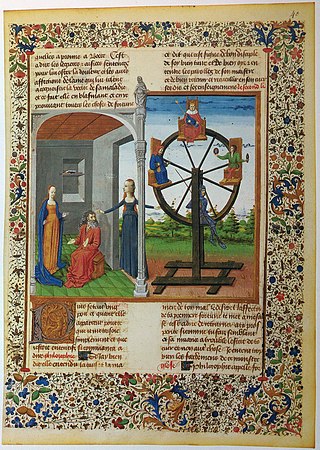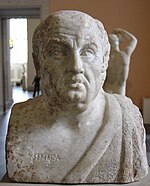
On the Consolation of Philosophy, often titled as The Consolation of Philosophy or simply the Consolation, is a philosophical work by the Roman philosopher Boethius. Written in 523 while he was imprisoned and awaiting execution by the Ostrogothic King Theodoric, it is often described as the last great Western work of the Classical Period. Boethius' Consolation heavily influenced the philosophy of late antiquity, as well as Medieval and early Renaissance Christianity.

Epicurus was an ancient Greek philosopher and sage who founded Epicureanism, a highly influential school of philosophy. He was born on the Greek island of Samos to Athenian parents. Influenced by Democritus, Aristippus, Pyrrho, and possibly the Cynics, he turned against the Platonism of his day and established his own school, known as "the Garden", in Athens. Epicurus and his followers were known for eating simple meals and discussing a wide range of philosophical subjects. He openly allowed women and slaves to join the school as a matter of policy. Of the over 300 works said to have been written by Epicurus about various subjects, the vast majority have been destroyed. Only three letters written by him—the letters to Menoeceus, Pythocles, and Herodotus—and two collections of quotes—the Principal Doctrines and the Vatican Sayings—have survived intact, along with a few fragments of his other writings. As a result of his work's destruction, most knowledge about his philosophy is due to later authors, particularly the biographer Diogenes Laërtius, the Epicurean Roman poet Lucretius and the Epicurean philosopher Philodemus, as well as the hostile but largely accurate accounts by the Pyrrhonist philosopher Sextus Empiricus, and the Academic Skeptic and statesman Cicero.

Lucius Annaeus Seneca the Younger, usually known mononymously as Seneca, was a Stoic philosopher of Ancient Rome, a statesman, dramatist, and in one work, satirist, from the post-Augustan age of Latin literature.
Eudaimonia, sometimes anglicized as Eudaemonia, Eudemonia or Eudimonia, is a Greek word literally translating to the state or condition of 'good spirit', and which is commonly translated as 'happiness' or 'welfare'.

The Nicomachean Ethics is Aristotle's best-known works on ethics: the science of the good for human life, that which is the goal or end at which all our actions aim. It consists of ten sections, referred to as books, and is closely related to Aristotle's Eudemian Ethics. The work is essential for the interpretation of Aristotelian ethics.

De Providentia is a short essay in the form of a dialogue in six brief sections, written by the Latin philosopher Seneca in the last years of his life. He chose the dialogue form to deal with the problem of the co-existence of the Stoic design of providence with the evil in the world—the so-called "problem of evil."
Aristo of Chios, also spelled Ariston, was a Greek Stoic philosopher and colleague of Zeno of Citium. He outlined a system of Stoic philosophy that was, in many ways, closer to earlier Cynic philosophy. He rejected the logical and physical sides of philosophy endorsed by Zeno and emphasized ethics. Although agreeing with Zeno that Virtue was the supreme good, he rejected the idea that morally indifferent things such as health and wealth could be ranked according to whether they are naturally preferred. An important philosopher in his day, his views were eventually marginalized by Zeno's successors.
Antiochus of Ascalon was a 1st-century BC Platonist philosopher. He rejected skepticism, blended Stoic doctrines with Platonism, and was the first philosopher in the tradition of Middle Platonism.
Lucius Junius Gallio Annaeanus or Gallio was a Roman senator and brother of the famous writer Seneca. He is best known for dismissing an accusation brought against Paul the Apostle in Corinth.

De Brevitate Vitae is a moral essay written by Seneca the Younger, a Roman Stoic philosopher, sometime around the year 49 AD, to his father-in-law Paulinus. The philosopher brings up many Stoic principles on the nature of time, namely that people waste much of it in meaningless pursuits. According to the essay, nature gives people enough time to do what is really important and the individual must allot it properly. In general, time is best used by living in the present moment in pursuit of the intentional, purposeful life.

The Epistulae Morales ad Lucilium, also known as the Moral Epistles and Letters from a Stoic, is a letter collection of 124 letters that Seneca the Younger wrote at the end of his life, during his retirement, after he had worked for the Emperor Nero for more than ten years. They are addressed to Lucilius Junior, the then procurator of Sicily, who is known only through Seneca's writings. Regardless of how Seneca and Lucilius actually corresponded, it is clear that Seneca crafted the letters with a broad readership in mind.

Cynicism is a school of thought in ancient Greek philosophy, originating in the Classical period and extending into the Hellenistic and Roman Imperial periods. According to Cynicism, people are reasoning animals, and the purpose of life and the way to gain happiness is to achieve virtue, in agreement with nature, following one's natural sense of reason by living simply and shamelessly free from social constraints. The Cynics rejected all conventional desires for wealth, power, glory, social recognition, conformity, and worldly possessions and even flouted such conventions openly and derisively in public.

Stoicism is a school of Hellenistic philosophy that flourished in Ancient Greece and Ancient Rome. The Stoics believed that the practice of virtue is enough to achieve eudaimonia: a well-lived life. The Stoics identified the path to achieving it with a life spent practicing the four virtues in everyday life—wisdom, courage, temperance or moderation, and justice—as well as living in accordance with nature. It was founded in the ancient Agora of Athens by Zeno of Citium around 300 BC.
Seneca's Consolations refers to Seneca’s three consolatory works, De Consolatione ad Marciam, De Consolatione ad Polybium, De Consolatione ad Helviam, written around 40–45 AD.
The philosophy of happiness is the philosophical concern with the existence, nature, and attainment of happiness. Some philosophers believe happiness can be understood as the moral goal of life or as an aspect of chance; indeed, in most European languages the term happiness is synonymous with luck. Thus, philosophers usually explicate on happiness as either a state of mind, or a life that goes well for the person leading it. Given the pragmatic concern for the attainment of happiness, research in psychology has guided many modern-day philosophers in developing their theories.

De Clementia is a two volume (incomplete) hortatory essay written in AD 55–56 by Seneca the Younger, a Roman Stoic philosopher, to the emperor Nero in the first five years of his reign.

De Tranquillitate Animi is a Latin work by the Stoic philosopher Seneca. The dialogue concerns the state of mind of Seneca's friend Annaeus Serenus, and how to cure Serenus of anxiety, worry and disgust with life.

De Ira is a Latin work by Seneca. The work defines and explains anger within the context of Stoic philosophy, and offers therapeutic advice on what to do to prevent anger.

De Otio is a 1st-century Latin work by Seneca. It survives in a fragmentary state. The work concerns the rational use of spare time, whereby one can still actively aid humankind by engaging in wider questions about nature and the universe.

De Constantia Sapientis is a moral essay written by Seneca the Younger, a Roman Stoic philosopher, sometime around 55 AD. The work celebrates the imperturbability of the ideal Stoic sage, who with an inner firmness, is strengthened by injury and adversity.















